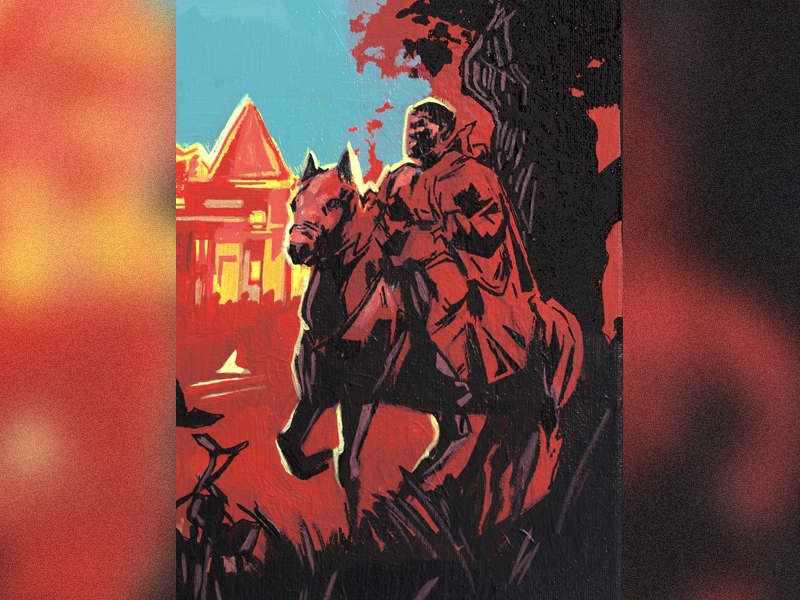The U of A Humanities Center's Nelson Hackett Project will host an academic conference Sept. 5 and 6 examining Hackett's 1841 flight from slavery, his extradition from Canada and his many legacies. Sponsored by the Diane D. Blair Center for Southern Politics and Society at the U of A, the conference is open to students, teachers and everyone interested in the history of slavery and freedom in Northwest Arkansas, the United States and broader Atlantic world.
In July 1841, Nelson Hackett fled Fayetteville and slavery. Atop his master's fastest horse, he made his way 360 miles through the slave states of Arkansas and Missouri and another 600 miles through the free states of the North before crossing into Canada at Detroit.
Setting foot in British Canada, Hackett thought he was a free man, but that would not be the case. His "owner," a man named Alfred Wallace, followed him; had him arrested for stealing the horse, a saddle and a coat; and demanded his extradition back the Arkansas to face charges for those thefts. When Canada's governor-general sent the fugitive back to the United States, Hackett became the first enslaved person that Canada sent back to bondage. He would also be the last. His extradition provoked an outcry from abolitionists — Black and white, American, Canadian and British — who successfully pressured the British government to make it practically impossible to extradite fugitives back to slavery.
The conference will kick off on the evening of Thursday, Sept. 6, with the keynote address "Taking Leave: Fugitive Slaves and the Politics of Slavery" by professor Richard Blackett in Giffels Auditorium on the second floor of the U of A's Old Main. Blackett, the Andrew Jackson Professor of History at Vanderbilt University, is a historian of the abolitionist movement in the United States and particularly its transatlantic connections. He is the author of eight books, most recently The Captive's Quest for Freedom: Fugitive Slaves, the 1850 Fugitive Slave Law and the Politics of Slavery (2018) and Samuel Ringgold Ward: A Life of Struggle (2023). Blackett is currently the president of the Southern Historical Association.
On Friday, Sept. 7, at the Pryor Center for Arkansas Oral and Visual History, 15 scholars from across North America will present papers that explore various aspects of Hackett's life and legacy. Some of the presentations will focus on Hackett in Fayetteville, but others will examine fugitivity, the Underground Railroad, Black abolitionism, historical memory and the difficulty of locating fugitives in the archives. The Pryor Center is at 1 E. Center St. on the Fayetteville Square.
Giffels Auditorium, Old Main, U of A Campus
Richard Blackett of Vanderbilt University, "Taking Leave: Fugitive Slaves and the Politics of Slavery"
Pryor Center, 1 E. Center St., Fayetteville Square
• John Davis, director, Pryor Center for Arkansas Oral and Visual History
• Brian Raines, dean, Fulbright College of Arts and Sciences
• Michael Pierce, U of A, "Nelson Hackett's Journey: An Introduction"
• Lisa Childs, U of A, "Nelson Hackett's Fayetteville: Slavers and Their Chattel on the Upland Frontier"
• Panel Chair: Tricia Starks, U of A
• Cooper Wingert, Georgetown University, "Underground Railroad in Northeastern Missouri and Southern Illinois"
• Megan Jeffreys, Cornell University/Freedom on the Move, "Fragmented Freedoms: Exploring Escape in the Digital Age"
• Panel Chair: Brian McGowan, U of A
• Amanda McGee, U of A, "Policing Freedom's Borders: Nelson Hackett's Extradition and the Prigg v. Pennsylvania Verdict"
• Roy Finkenbine, University of Detroit Mercy, "The Colored Vigilant Committee of Detroit: A Legacy of the Nelson Hackett Case"
• Panel Chair: Karynecia Conner, U of A
• Keith Griffler, University of Buffalo, "The Legacy of Nelson Hackett for Transnational Black Abolitionism: The View from Canada's 'Black Mecca'"
• Nina Maroney-Reid, University of Western Ontario/Huron, "The Afterlives of Nelson Hackett: Black Abolitionist History in Chatham, Canada West"
• Panel Chair: Matthew Stanley, U of A
• Susan Marren, U of A, "Nelson Hackett's Unfinishable Story: Slave Narratives and Inconclusive Endings"
• Vivien Tejada, UCLA, "Indian Territory, Canada, and Freedom's Legal Borderlands, 1841-1854"
• Panel Chair: Patrick Williams, U of A
• Kelly Houston Jones, Arkansas Tech University, "The Captors' Quest: The Fugitive Slave Law in Indian Territory"
• Danyelle Valentine, Vanderbilt University, "An Alternative Diaspora: African American out Migration to Trinidad and the British West Indies, 1783-1865"
• Panel Chair: Justin Gage, U of A
• Valandra, U of A, and Roanne Elliott, Washington County Remembrance Project, "Claiming Freedom, Geography, and Personhood: Nelson Hackett as a Model of Resistance"
• Caree Banton, U of A, "The Fugitive's Archive: Reading Archival Silences in the Nelson Hackett Case"
• Panel Chair: Candace Cunningham, U of A
Topics
Contacts
Michael Pierce, associate professor
Department of History
479-575-6760,
